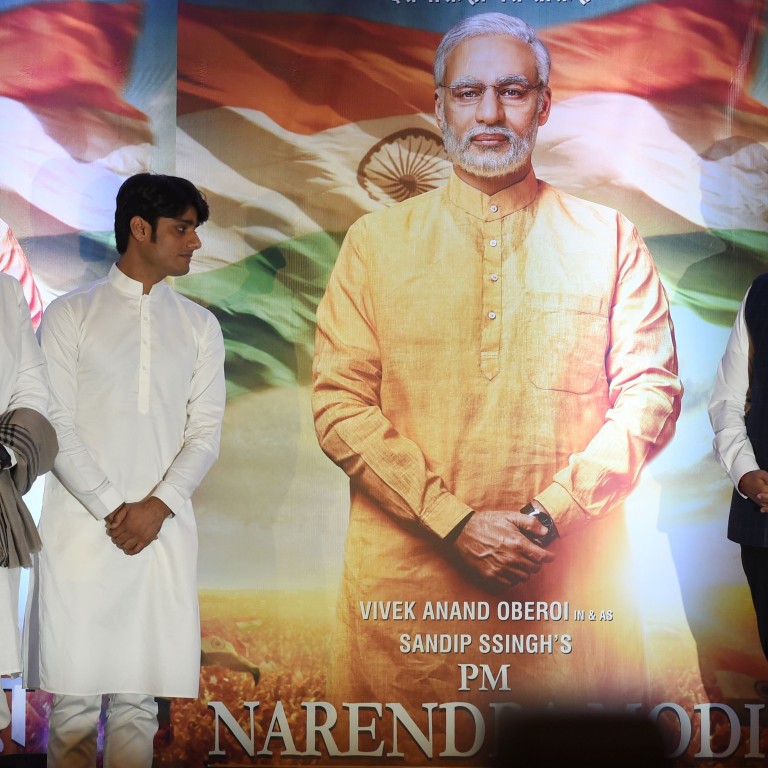
Bollywood embraces India’s election season but are these new films entertainment or propaganda?
- Filmmakers say it makes good business sense to release movies with a political backdrop in the run-up to an election
- However, supporters of the Congress party have attempted to block the release of one film, claiming it smears the party
Bollywood filmmakers are seeking to cash in on this year’s Indian general election with a host of political movies, some of which smack of propaganda according to critics.
The Hindi film industry has a long tradition of producing politically tinged flicks but industry watchers say 2019’s offerings are more partisan than ever before.
“What we have this year are quite a few films, some of which are biopics, that appear to be uncritical and unabashedly push the agenda of a particular party, its policies and political philosophies,” said reviewer Nandini Ramnath.
The Accidental Prime Minister and Uri: The Surgical Strike were released on Friday. Films about the lives of two prominent politicians air later in January while a biopic on Prime Minister Narendra Modi is also in the works.
The silver screen and politics have often intertwined in India. Many actors have become politicians while Bollywood has not shied away from tackling political issues in its plotlines.
Why Indian films like Dangal and Toilet are so popular in China
Jaane Bhi Do Yaaro (Let it be, friends) became a cult classic in 1983 for its satirical takedown of corruption while 2010’s Peepli Live was praised for tackling the difficult subject of farmer suicides.
Political movies have also fallen foul of the government. Kissa Kursi Ka (Story of the Chair) and Aandhi (Storm) were both banned by then prime minister Indira Gandhi in the 1970s. The former was viewed as satirising her politics while the latter was allegedly based on her relationship with her estranged husband, who died several years earlier.
Supporters of Gandhi’s party, Congress, have tried to stir up controversy around the The Accidental Prime Minister, holding protests and even going to court, unsuccessfully, to try to block its release. They claim it portrays senior Congress members in a bad light and is propaganda for Modi and his ruling Hindu nationalist Bharatiya Janata Party (BJP) – allegations the director denies.
The Hindi-language film features veteran actor Anupam Kher, a vocal supporter of Modi, playing the leader’s predecessor Manmohan Singh, also of the Congress party, as premier. It is based on a memoir written by Sanjaya Baru, a former adviser to Singh.
Actress who helped trigger India’s #MeToo movement was ‘inspired by God’
“This film is not about politics but about the relationship between Dr Singh and Sanjaya Baru through Baru’s eyes. They are both heroes of the film. It’s not propaganda,” director Vijay Gutte said.
Some social media users and film critics have accused Kher of comically mimicking Singh’s slow and measured way of walking and talking but the actor believes he has captured his mannerisms perfectly.
“It will take you a little time to distinguish between the real and the reel,” Kher tweeted last month when posting a photo of Singh alongside one of himself in character. “That is the authenticity and the sincerity one has applied in portraying #DrManmohanSingh.”
Several movies touching on politics were released during India’s last election year in 2014, notably Youngistan and Bhoothnath Returns in which superstar Amitabh Bachchan played a ghost running against an evil candidate.
How first Netflix Indian series scored 100 per cent on Rotten Tomatoes
Filmmakers say it makes good business sense to release movies with a political backdrop in the run-up to an election while others may be secretly hoping that they translate into votes as well.
The nationalistic, all-guns-blazing Uri: The Surgical Strike, which celebrates the Indian army’s strikes on militants in 2016 in response to a raid that had killed 19 Indian soldiers, is likely to be popular.
Modi was widely lauded for the operation and the film features Vicky Kaushal as an army major in charge of avenging the attack – which India blamed on its arch-enemy Pakistan – on the Uri base.
Thackeray, a biopic about divisive Mumbai politician Bal Thackeray, who died in 2012, is tipped to be a hagiography designed to boost support for the Shiv Sena – a Hindu chauvinist party he led and founded.
Bollywood’s ‘code of omerta’ on sexual harassment may finally be cracking
A Shiv Sena politician has written the screenplay of the movie which is scheduled to hit screens on January 25, around what would have been Thackeray’s 93rd birthday. The first of a two-part Telugu-language biopic on actor-turned Andhra Pradesh politician N.T. Rama Rao is also due in January.
“Popular cinema has emerged as an arena for propaganda, with a greater ability to sway opinion and spread ideas than other media,” said Ramnath, a critic for Scroll.in.

.png?itok=arIb17P0)